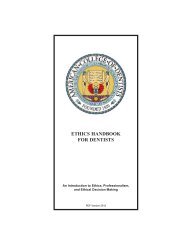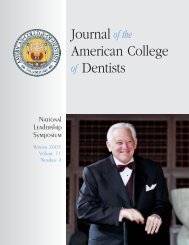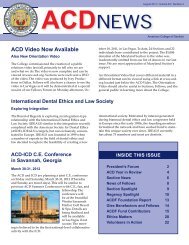Journal of the American College of Dentists
Journal of the American College of Dentists
Journal of the American College of Dentists
You also want an ePaper? Increase the reach of your titles
YUMPU automatically turns print PDFs into web optimized ePapers that Google loves.
Students’ Views on Ethics<br />
28<br />
The first approach is basically similar<br />
to an option we give patients when<br />
presenting a treatment plan to <strong>the</strong>m: “do<br />
nothing.” That is, allowing students to<br />
simply hit “rock bottom” if <strong>the</strong>y should<br />
experience an ethical breach. After all,<br />
this is pr<strong>of</strong>essional school and <strong>the</strong>re<br />
should be a certain level <strong>of</strong> trust between<br />
students and faculty, right? The scenario<br />
may play out as follows. Imagine yourself<br />
in this position. The sweat is ga<strong>the</strong>ring on<br />
your forehead as you struggle to finish<br />
<strong>the</strong> final exam in pharmacology. The<br />
paper next to you is practically begging<br />
to be cited on your own page. Following<br />
<strong>the</strong> glance that lasted two seconds too<br />
long, you’re out in <strong>the</strong> hallway being<br />
marched up to <strong>the</strong> dean’s <strong>of</strong>fice. As a<br />
result, a very definitive decision is made<br />
to suspend you from dental school.<br />
Following this decision, it is <strong>the</strong> hope<br />
that you, <strong>the</strong> perpetrator, will realize <strong>the</strong><br />
errors <strong>of</strong> your ways and change your<br />
behavior in <strong>the</strong> future and that this<br />
abrupt response will serve as a deterrent<br />
to o<strong>the</strong>r students who might be tempted<br />
to cheat. However, since past behavior<br />
is <strong>the</strong> best predictor <strong>of</strong> future behavior,<br />
will this really work or will you simply<br />
just get better at cheating?<br />
Is this really an appropriate approach<br />
to fostering pr<strong>of</strong>essional development?<br />
It is extremely reactionary in nature.<br />
Allowing students to flounder along<br />
without ethical guidance until <strong>the</strong>y “do<br />
something stupid” and <strong>the</strong>n punishing<br />
<strong>the</strong>m may deter o<strong>the</strong>rs from doing <strong>the</strong><br />
same thing but this punitive approach is<br />
in itself unpr<strong>of</strong>essional. Faculty, who<br />
should be mentors become policemen,<br />
lying in wait to catch possible cheaters.<br />
Also, <strong>the</strong> Commission on Dental Accreditation<br />
(CODA) expects dental schools to<br />
have a formal curriculum in ethics.<br />
Although <strong>the</strong>re need to be repercussions<br />
for academic dishonesty, “scaring people<br />
straight” is not an appropriate way to<br />
promote pr<strong>of</strong>essionalism and teach selfregulation<br />
<strong>of</strong> <strong>the</strong> pr<strong>of</strong>ession.<br />
Ano<strong>the</strong>r approach to teaching pr<strong>of</strong>essional<br />
development is one that I have<br />
seen over and over again throughout my<br />
educational career. The reason for its<br />
prevalence is its simple approach and<br />
ease <strong>of</strong> implementation. I am speaking<br />
<strong>of</strong> <strong>the</strong> case-based method in which<br />
different vignettes are presented, options<br />
are given, and <strong>the</strong> correct choice is<br />
revealed to <strong>the</strong> learners. It is my opinion,<br />
however, that this is not <strong>the</strong> best way to<br />
teach ethics and pr<strong>of</strong>essionalism at this<br />
point in our careers, for <strong>the</strong> following<br />
reasons. First <strong>of</strong> all, each ethical situation<br />
is different and has nuances that differentiate<br />
it from anything previously<br />
encountered. What works as <strong>the</strong> “right<br />
decision” in one scenario may not work<br />
in ano<strong>the</strong>r very similar one with a small<br />
difference. In <strong>the</strong> case-based approach<br />
it is more practical to teach underlying<br />
principles ra<strong>the</strong>r than “situations and<br />
solutions.” Even <strong>the</strong>n, this model has its<br />
limitations. Many students will agree to<br />
a given conclusion just because <strong>the</strong>y<br />
know it is what <strong>the</strong> instructor wants to<br />
hear. For example, it is easy to know<br />
that cheating on a test is wrong but it is<br />
a lot more difficult to actually turn in a<br />
classmate you know is cheating or to<br />
resist <strong>the</strong> temptation yourself. Students<br />
find creative ways to justify unethical<br />
behavior if it involves <strong>the</strong>m or <strong>the</strong>ir close<br />
friends directly! The challenge is to get<br />
students to not only recognize what ought<br />
to be done in a particular situation but,<br />
when it comes down to it, to actually<br />
have <strong>the</strong> guts to “just do it.”<br />
Student Ethical Responsibility<br />
I believe <strong>the</strong> most effective way to teach<br />
ethical problem solving in dental education<br />
should take a different approach.<br />
This approach involves much more<br />
peer interaction and discussion. Students<br />
listen to each o<strong>the</strong>r and share a common<br />
bond and consciousness through <strong>the</strong><br />
dental school experience. On <strong>the</strong> o<strong>the</strong>r<br />
hand, through a diverse student body,<br />
we all bring different things to <strong>the</strong><br />
table. If <strong>the</strong> ethical didactic foundation<br />
is in place, students can intelligently<br />
approach an ethical dilemma with a<br />
group <strong>of</strong> peers and come to a rational<br />
conclusion with an understanding <strong>of</strong><br />
why <strong>the</strong> answer is what it is.<br />
Using a small-group format, dilemmas<br />
can be considered and debated within<br />
<strong>the</strong> ethical framework outlined in<br />
class. Students may have more candid<br />
discussions among <strong>the</strong>ir peers about<br />
issues, not having faculty listening in<br />
on <strong>the</strong> conversation. Ano<strong>the</strong>r benefit <strong>of</strong><br />
ethical discussion is that it gives people<br />
an opportunity to poke holes in our<br />
arguments. O<strong>the</strong>r people’s perspectives<br />
<strong>of</strong>ten bring light to our own biases and<br />
errors in thought. In seeing <strong>the</strong> errors<br />
in our own thought processes, <strong>the</strong><br />
principles that we believe in can be<br />
applied more objectively and honestly.<br />
Students who are comfortable with <strong>the</strong>ir<br />
ideals yet able to see any situation more<br />
objectively will be able to navigate a<br />
dicey dilemma and come out completely<br />
honest to <strong>the</strong> convictions that guide<br />
<strong>the</strong>ir everyday behavior.<br />
So <strong>the</strong> question still remains: are<br />
things already set? It is my firm belief<br />
that anyone, at any time, can start brand<br />
new. Pr<strong>of</strong>essional development is an<br />
ongoing process throughout not only<br />
dental school, but our entire careers.<br />
New starts do not come, however, without<br />
breaking down held ideals in favor<br />
<strong>of</strong> new paradigms. If we are willing to<br />
take <strong>the</strong> time and do <strong>the</strong> hard work <strong>of</strong><br />
listening to each o<strong>the</strong>r and learning<br />
from our common experiences as well<br />
as our diversity, we can ensure that<br />
<strong>the</strong> principles <strong>of</strong> autonomy, beneficence,<br />
justice, nonmaleficence, and veracity will<br />
be upheld every day and that students<br />
will gain an understanding <strong>of</strong> why <strong>the</strong>se<br />
principles are intrinsically valuable to a<br />
pr<strong>of</strong>ession well practiced. ■<br />
2011 Volume 78, Number 4





